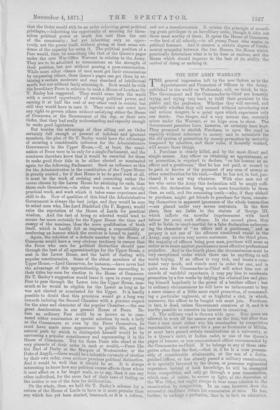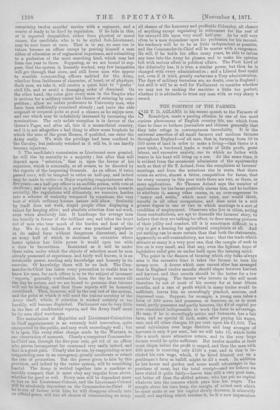THE NEW ARMY WARRANT.
THE general impression left by the new Orders as to the Appointments and Promotion of Officers in the Army, published to the world on Wednesday, will, we think, be this. The Government and the Commander-in-Chief are honestly trying, and trying very hard, to fulfil their promises to the public and the profession. Whether they will succeed, and especially whether they will succeed without introducing new and !serious dangers, is a point upon which experience only can decide. One danger, and a very serious ono, certainly arises under the Warrant, as we hope soon to show. The Government promises have, however, as certainly been kept. They promised to abolish Purchase, to open the road to capacity without reference to money, and to substitute for the old system of promotion by money promotion by seniority tempered by selection, and their rules, if honestly worked, will secure these things.
1. Purchase is clearly killed, and by the nanst direct and simple means. Any officer on obtaining an appointment, or on promotion, is required to declare, "on his honour as an officer and a gentleman," that he has not paid, or caused to be paid, or known of the payment of any sum of money or other consideration for his rank,—that he has not, in fact, pur- chased it in any way whatever. With nine men out of ten who enter the Army this declaration will be amply suffi- cient, the declaration being much more formidable to them than an oath, and the remaining tenth—who, if they wished to purchase, might get friends to purchase for them, remain- ing themselves in apparent ignorance of the whole transaction —are placed under very severe restraints. In the first place, they are liable to the statute of George III.
which inflicts six months imprisonment with hard labour for every such offence. In the second place, they
will be liable to court-martial for a false declaration unbecom- ing the character of "an officer and a gentleman," and as perjury is not one of the offences considered venial in the Army, may receive very severe sentences. In the third place, the majority of officers being poor men, purchase will seem so unfair as to rouse against purchasers a most effective professional prejudice. And in the fourth place, the circumstances must be very exceptional under which there can be anything to sell worth buying. If an officer is very rich, and wants a com- mand very much, and stands next in order for one, and is quite sure the Commander-in-Chief will select him out of crowds of watchful expectants, it may pay him to accelerate promotion by a few weeks by defying the criminal law and plac- ing himself hopelessly in the power of a brother officer ; but in ordinary circumstances he will have no inducement to buy a mere chance of a little more rapid promotion, of command- ing a particular regiment, at so frightful a risk, in which, moreover, the officer to be bought out must join. Purchase, in fact, is dead, unless Government connives at it, and it is hardly possible to conceive its interest in conniving. 2, The military road is thrown wide open. Two years are allowed to work off the names now on the lists, but after that time a man must either win his nomination by competitive examination, or must serve for a year as lieutenant of Militia, or must have passed certain examinations at a university, or be a Queen's cadet, or Indian cadet, or one of the Queen's pages of honour, or non-commissioned officer recommended by the Commander-in-Chief. If he belongs to any of these cate- gories other than the first,—that is, if he is a man presum- ably of considerable attainments, or the son of a distin- guished officer, or has already passed a military examination, or is specially favoured by the Queen, or possesses regimental experience instead of book knowledge, he will be exempted from competition, and only go through a pass examination, which may, of course, be severe or. light, at the discretion of the War Office, but ought always to bear some relation to the examination by competition. In .no case, however, does the successful candidate obtain his commission at once. He has, further, to undergo a probation, that is, in fact, an education,
comprising twelve months' service with a regiment, and a course of study to be fixed by regulation. If he fails in this, or is reported disqualified, either from physical or moral causes, the candidate, who is to be styled Sub-Lieutenant, may be sent home at once. That is to say, no man can in future become an officer except by proving himself a man either of education or of regimental experience, and submitting to a probation of the most searching kind, which may last from one year to three. Supposing, as we are bound to sup- pose, that the system is honestly worked, very few incapables will get through that sieve, and still fewer men who appear to sensible commanding officers unfitted for the Army, whether from feebleness of character, of heart, or of physique. Such men, we take it, will receive a quiet hint to " prefer " civil life, and so avoid a damaging order of dismissal. On the other hand, the rules give every man in the Empire who is anxious for a military career his chance of entering by com- petition; allow no unfair preference to University men, who have been sufficiently examined already ; and leave the able sergeant or corporal quite as good a chance as he enjoys now, and one which may be indefinitely increased by increasing the nominations. The only unfair exception is in favour of the Queen's Pages, and after all, this is a monarchical country, and it is not altogether a bad thing to allow some loophole by which the sons of the great Houses, if qualified, can enter the Army easily. We wish the privilege had been confined to the Cavalry, but jealously watched as it will be, it can hardly become injurious.
3. The candidate's commission as Lieutenant once granted, he will rise by seniority to a majority ; but after that will depend upon "selection," that is, upon the favour of his superiors, which is nominally, at all events, to be directed by the reports of the inspecting Generals. As an officer, if twice passed over, will be tempted to retire on half-pay, and indeed may be made to retire—a Major requiring reappointment after five years—as a half-pay officer is an audible person, with vote at elections ; and as opinion in a profession always tends towards seniority, the regulations will ultimately, we conceive, harden into a scheme of seniority tempered by rejections, the very best of which ordinary human nature will allow. Seniority by itself does not work, stupid people often displaying a talent for keeping alive ; and absolute selection does not work, even when absolutely fair. It handicaps the average men too heavily in favour of the brilliant one, and takes the heart out of men who bear much of the burden and heat of the day. We do not believe it over was practised anywhere in its naked form without dangerous discontent, and in an army half of which is stationed in countries where home opinion has little power it would open too wide a door to favouritism. Restricted as it will be under these rules, under which the objects of selection must be men already possessed of experience, and fairly well known, it is an invaluable power, needing only knowledge and honesty in its exercise. Of knowledge there will be no lack. The Com- mander-in-Chief has taken every precaution to enable him to know his men, for each officer is to be the subject of incessant "reports," generally confidential, from the day he enters till the day he retires, and we are bound to presume that fairness will not be lacking, and that these reports will be honestly considered. That, however, will be the real test of the system, and the point at which it will need the jealous scrutiny of the Army itself, which, if selection is worked unfairly or too harshly, will become dispirited. Parliament can do very little in the face of confidential reports, and the Army itself must be its own chief watchman.
The assimilation of Majorities and Lieutenant-Colonelcies to Staff appointments is an extremly bold innovation, quite unexpected by the public, and may work exceedingly well ; but it is open, like every other change made by the Warrant, to one observation of moment. Clearly a competent Commander- in-Chief can, through the five-year rule, get rid of an officer who proves incompetent for command very easily indeed, and that is a great gain. Clearly also he can, by reappointing or not reappointing men in an emergency, greatly accelerate or retard the rate of promotion. But the power given to him by this provision, and indeed by the entire system, will be something fearful. The Army is welded together into a machine so terribly compact, that it must obey any impulse from above, whether for good or evil. Every man will be dependent more or less on his Lieutenant-Colonel, and the Lieutenant-Colonel will be absolutely dependent on the Commander-in-Chief. If he is out of favour with him, he will disappear silently into an official grave, will lose all chance of commanding an army, all chance of the honorary and profitable Colonelcy, all chance of anything except vegetating in retirement for the rest of his ennuy6d life upon very small half-pay. As he will very often be a man dependent upon his profession for his income, his tendency will be to be as little independent as possible, and the Commander-in-Chief will be master with a vengeance. He will, if he holds his office many years, be able to infuse any tone into the Army he pleases, and to make his opinion felt with serious effect in political affairs. The First Lord of the Admiralty has, it is true, a similar power, but then he is changed with every administration ; and a Liberal fleet could not, even if it tried, greatly embarrass a Tory administration. The days of military terrorism are, no doubt, over in England ; but still it will be as well for Parliament to consider whether we may not be making the machine a little too perfect, whether it is advisable to trust any man with so very sharp a sword.



































 Previous page
Previous page